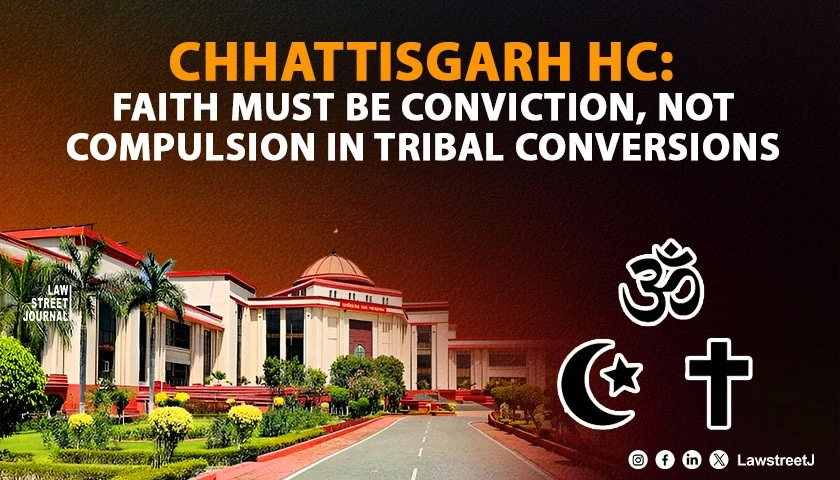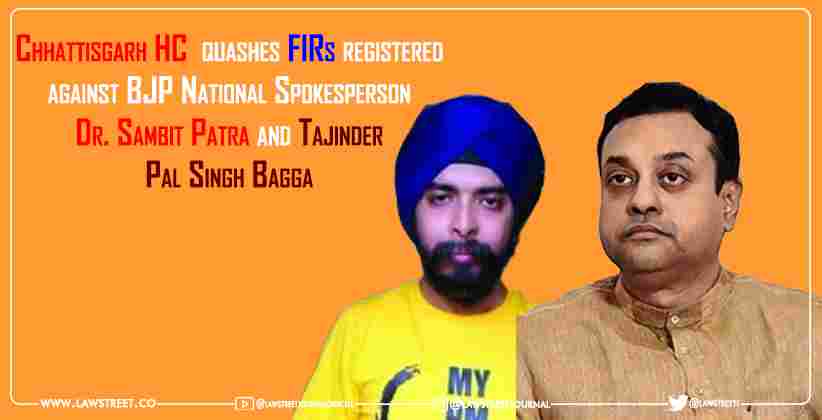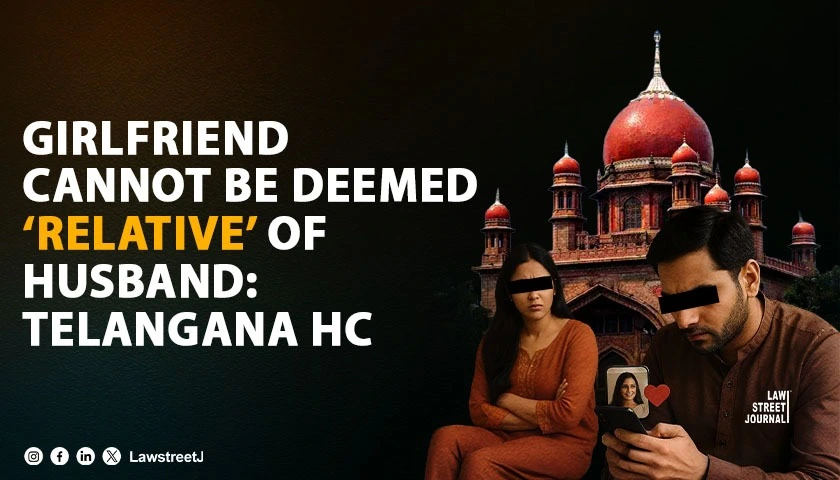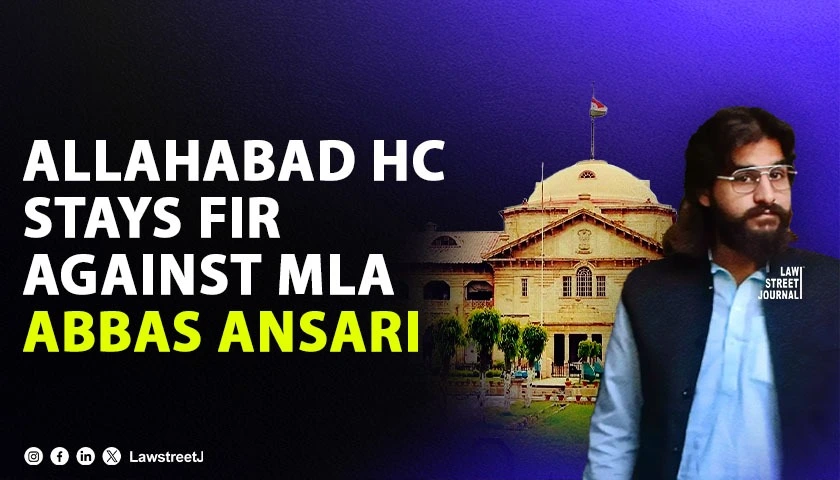Chhatisgarh: The Chhattisgarh High Court recently held that mass conversions of tribal populations to Christianity through inducement and exploitation have been causing social divisions, communal tensions, and even violent clashes within indigenous communities.
A Division Bench comprising Chief Justice Ramesh Sinha and Justice Bibhu Datta Guru observed that while the Constitution guarantees religious freedom, the misuse of this liberty through coercion, inducement, or deceptive practices has emerged as a serious concern threatening India’s social fabric and cultural heritage.
The Bench noted that motivated conversions not only disrupt social harmony but also undermine the cultural identity of indigenous tribal communities. It emphasized that conversion activities in remote tribal areas often target economically vulnerable and illiterate populations by offering material benefits in exchange for religious conversion.
The court remarked that missionary activities, which initially focused on social welfare through educational and healthcare institutions during the colonial era, have increasingly transformed into platforms for proselytization. The Bench observed that among Scheduled Tribes and Scheduled Castes, gradual religious conversion has occurred under promises of improved livelihoods, educational opportunities, and social equality.
“What was once regarded as social service has become, in numerous instances, a calculated instrument of religious expansion. The concern arises when conversion is no longer an expression of personal faith but results from inducement, manipulation, or exploitation of vulnerability,” the court stated. The Bench further noted that in remote tribal regions, missionaries stand accused of targeting impoverished families by providing monetary assistance, complimentary education, healthcare facilities, or employment opportunities in return for conversion.
The court emphasized that such practices distort the essence of voluntary faith and constitute cultural coercion. This process has also created deep social rifts within tribal communities, the Bench added.
Discussing the consequences of tribal conversions, the court stated that conversion disrupts the organic connection between tribal communities and their ancestral traditions. The erosion of indigenous faiths often leads to the disappearance of native languages, traditional rituals, and customary legal systems. Additionally, newly converted individuals frequently experience rejection from their original community, resulting in social isolation and fragmentation.
The Bench further observed that religious conversion can influence political representation, as certain constitutional privileges like Scheduled Tribe or Scheduled Caste status are connected with religion. Conversion may therefore alter demographic compositions and political dynamics, adding further complexity to the issue.
The court acknowledged that India’s secular framework flourishes on coexistence and mutual respect for diversity. However, it clarified that religious conversion constitutes a legitimate exercise of conscience only when it is voluntary and spiritual in nature.
“When it transforms into a calculated act of exploitation masquerading as charity, it erodes both faith and freedom. The so-called ‘conversion by inducement’ practiced by certain missionary organizations is not simply a religious matter—it is a social threat that endangers the unity and cultural continuity of India’s indigenous peoples. The solution lies not in intolerance, but in ensuring that faith remains a question of conviction, not compulsion,” the court declared.
The petitioners had filed public interest litigations challenging hoardings erected in at least eight villages of Kanker district that prohibited the entry of pastors and “converted Christians” into the villages. They contended that these hoardings violated fundamental rights guaranteed under Articles 19(1)(d) and 25 of the Constitution of India, creating fear among Christian minorities and restricting their freedom of conscience and movement.
The petitioners alleged that the hoardings were erected at the instigation of government authorities, citing a circular dated August 14, 2025, issued by the Director of Panchayat. They claimed that even Christian residents of these villages were being prevented from entering their own villages, and that some had faced violence and property demolition.
In response, the State contended that the petitions were based on unfounded apprehension. It argued that the circular was issued solely to preserve the traditional culture and heritage of Scheduled Tribe communities, without any instruction or instigation to erect hoardings or spread religious hatred. The State further submitted that the hoardings were installed by respective Gram Sabhas exercising their powers under the Panchayat (Extension to Scheduled Areas) Act, 1996 (PESA Act), and the Chhattisgarh PESA Rules, 2022, specifically to protect local cultural heritage from destructive behaviour.
The State emphasized that the hoardings only prohibit pastors from other villages who enter for conversion activities, not Christian residents of the villages themselves. It also highlighted previous disputes between local tribes and converted Christians which had resulted in law-and-order concerns, including a major incident of violence in Narayanpur district in 2023.
The court noted that the hoardings were installed by Gram Sabhas following a state government circular. However, it found that the circular itself contained no material authorizing discrimination against any religious group. It observed that the hoardings only restrain entry for the purpose of conducting conversion activities, and therefore, the petitioners’ apprehension that Christians in general had been banned was “unfounded.”
The Bench stated that the hoardings appear to have been installed by the concerned Gram Sabhas as a precautionary measure to safeguard the interests of indigenous tribal populations and local cultural heritage. It referenced the Chhattisgarh Dharma Swatantrya Adhiniyam, 1968, which prohibits conversion through force, allurement, or fraudulent means—a law whose constitutionality was upheld by the Supreme Court in Rev. Stanislaus v. State of Madhya Pradesh.
“The expression ‘right to propagate religion’ under Article 25 of the Constitution does not extend to converting another person through inducement, force, or fraudulent means. The 1968 Act prohibits such activities. Therefore, a general cautionary hoarding intended to prevent illegal conversion activities cannot, per se, be termed unconstitutional,” the court reasoned.
The court also noted that the petitioners had an alternative statutory remedy available under Rule 14 of the PESA Rules, 2022, which allows affected persons to approach the Gram Sabha for reconsideration and subsequently appeal to the Sub-Divisional Officer (Revenue) if dissatisfied. Since the petitioners had not exhausted this remedy, the court directed them to utilize the statutory mechanism before approaching the court.
Consequently, the court declined to grant relief to the petitioners but permitted them to avail the alternative remedy. It also directed that if the petitioners or any individual apprehend threats to life, liberty, or movement, they may seek protection from the jurisdictional police, which shall consider such requests in accordance with law.
Case Title: Digbal Tandi v. State of Chhattisgarh & Others
Case Numbers: WPPIL No. 83 of 2025 and WPPIL No. 86 of 2025
Date of Judgment: 28.10.2025
For the Petitioners: Adv. Kishore Narayan; Dr. Arpit Lall; Adv. Ayush Lall
For the Respondents: Adv. Y.S. Thakur, Additional Advocate General, along with 11 other advocates




![SC sets free man from case under SC/ST Act as offence not committed due to caste [Read Judgment]](/secure/uploads/2024/01/lj_4809_5ccb3cf2-6198-4e45-bb33-bfaa9b67a897.jpg)
![SC to consider forming guidelines on trial for deaf-dumb people [Read Order]](/secure/uploads/2024/04/lj_3160_483df315-842c-414c-9d28-65634ae6e806.webp)






